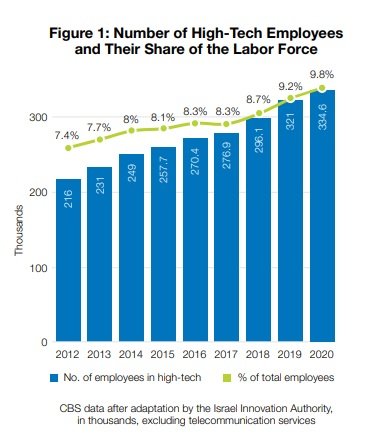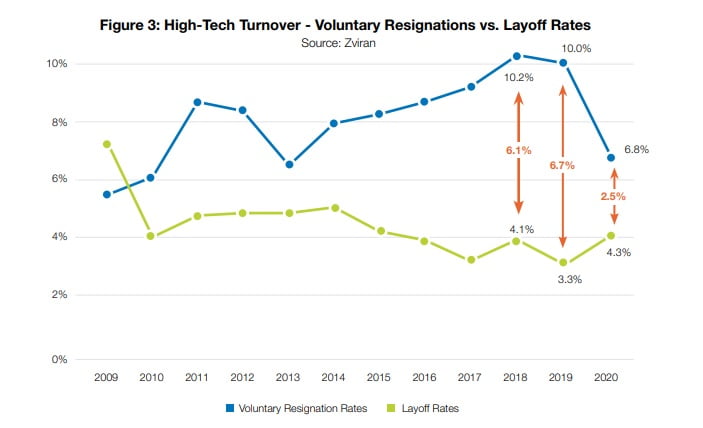Israel’s high-tech industry experienced modest growth in 2020, amid a raging global pandemic, with the percentage of people working in the sector up 0.6 percent to make up 9.8 percent, or 334,600 employees, of the national workforce, according to a new joint report released this month by Start-Up Nation Central (SNC) and the Israel Innovation Authority (IIA). The rate of workers employed in the high-tech sector was locked at about eight percent for about a decade before 2019 when the rate stood at 9.2 percent.
At the same time, the shortage of tech workers dropped significantly in 2020, with an estimated 13,000 open tech positions in late 2020 (down from 18,500 open tech positions in the industry the previous year) and 60 percent of companies reporting difficulties recruiting employees for R&D roles, according to the findings. The SNC-IIA report was based on data collected by the Central Bureau of Statistics (CBS), SNC’s Finder platform, and the Israel Innovation Authority, among other organizations, as well as a survey of 292 high-tech companies with more than 100,000 employees, comprising about one-third of the industry’s workforce.
SEE ALSO: 10 Israeli-Founded Companies Reach Unicorn Status In 1st Quarter Of 2021
The report’s authors noted that though the shortage of tech workers dropped by 30 percent, 13,000 was still a high figure, making the sector an “employees’ market” when it comes to core R&D positions. This decline is partially due to a significant decrease in the number of high-tech employees who resigned voluntarily amid the uncertainty, the lowest in seven years, according to the publication titled “2020 High-Tech Human Capital Report.”

“During periods of prosperity in high-tech, employees who choose to resign and move to another company are a significant driver of recruitment,” the authors wrote. In non-R&D recruitment, just 25 percent of the companies reported difficulty finding suitable talent in these areas.
Overall, says Sagi Dagan, VP, Head of Growth Division at the IIA, “the economy declined very slightly compared to other global economies, even in a year with a huge global crisis.”
“We saw a large increase in investments, especially in the software field, and the tech sector continued to grow,” Dagan tells NoCamels. In 2020, Israeli companies and startups raised nearly $10 billion, breaking new investment records even amid the global health crisis.

Uri Gabai, co-general manager at SNC, says the report shows impressive growth hampered somewhat by a strong need for expertise. “To still have, in 2020, 13,000 positions open shows chronic shortage. The high-tech sector may be racing forward but it needs more talent,” Gabai explains.
According to the report, high-tech companies and employees felt the full brunt of the pandemic’s impact in the second quarter of 2020 (Q2 2020), with workers being furloughed or let go, but recovery was evident in the next quarter and the number of employees grew once again.
Smaller companies and startups were more affected by the crisis, while multinationals in Israel weathered it better. According to the report, over one-third of smaller companies (1-10 employees) surveyed reported being ”severely affected” by the crisis and were more likely to have frozen recruitment, faced a decrease in the number of experienced tech employees, and reduced their demand for tech positions in relation to their workforce.
Multinationals, with more resources, and software-driven sectors, were less affected, according to the findings. This was reflected in their higher demand for employees, fewer workers placed on leave, and a move toward replacing less experienced employees with more senior workers. The survey showed that in 2020 these companies increased their number of experienced technological employees by 2 percent but reduced the number of technological juniors (employees with up to two years’ total experience) by 3 percent.
Meanwhile, sectors such as telecommunications and manufacturing were forced to reduce their workforce by around 3 percent on average.
“The negative impact of the crisis on startups’ economic activity may hardly be felt in the short-term, but may later translate into fewer growth companies that would have employed thousands of employees with high productivity and wage levels,” Gabai noted in a statement accompanying the report.
A chronic lack of diversity in Israeli high-tech
One of the key takeaways from the report is the marked slowdown in the recruitment of employees from more diverse sectors, like the Arab community, which makes up roughly 20 percent of the Israeli population, and the ultra-Orthodox community, with similar figures.
“The representation of women, Arabs and the ultra-Orthodox community had been on a steady upward trend in recent years, however this trend halted in the past year,” the report read.
Overall, the share of women in high-tech was similar to the previous year at 28 percent, with women occupying 23 percent of all technological positions and 19 percent of technology management positions, according to the report. But women make up just 5 percent of CTO roles and 9 percent of CEO positions – and 93 percent of HR.
Sign up for our free weekly newsletter
SubscribeAn increasing rate of female founders and entrepreneurs in recent years was also reversed in 2020, according to the report, with just 4.5 percent of startups founded by women last year and 84.5 founded by men (11 percent of
companies were founded jointly by men and women.

Gabai tells NoCamels these numbers were “extremely disappointing” and the representation of women in high-tech continues to be “a huge challenge that we have to treat as a society, starting from young ages, up until entry into the workforce, the work-life balance, etc.”
One positive trend in this area, according to the report, is the proportion of women studying high-tech-related professions in higher education institutions. In the last decade, the representation of women among all undergraduate students in math and computer science has increased by about five percentage points. In absolute numbers, the number has about doubled since the beginning of the last decade.
The proportion of Arab employees in the high-tech sector, meanwhile, is still less than 3 percent even as the representation of Arab students in high-tech professions has increased in recent years, and their share of total undergraduate students almost doubled between 2010 and 2020, from 7.2 percent to 12.8 percent, according to the report.
The share of ultra-Orthodox employees in high-tech was similar, at 3.3 percent, while the proportion of women among ultra-Orthodox employees experienced a moderate increase from 71.1 percent in 2018 to 73.5 percent in 2020.
SEE ALSO: Israeli Pilot Program Successfully Boosts High-Tech Jobs For Ultra-Orthodox Women
Solving the talent shortage in the Israeli tech industry
The report, like previous ones, noted that to help solve the chronic talent shortage, companies and organizations should recruit more diversely and be more open to hiring students graduating from academic institutions (like colleges) and non-academic training programs, as well as juniors.
“The coronavirus crisis has unevenly affected the employment of technological juniors. Companies that were largely affected by the crisis experienced an average reduction of 24% of juniors in their workforce, while companies that were positively affected increased their technological junior positions by about 37%,” the report said.
One positive development of the pandemic was the necessity to WFH (work from home) or at least in a hybrid format, which “presents a great opportunity,” Gabai tells NoCamels, to integrate employees from diverse backgrounds and to make adjustments. These new models of employment will make it “possible to bridge constraints arising from work–family balance, cultural barriers and geographical distance.”

Gabai said in the statement alongside the report that generally speaking, “the resolution to this chronic shortage can likely be found in systematic, cross-sectoral collaborations which will create widely implementable solutions. Without an extensive integration of women and members of the Arab and Ultra-Orthodox communities into the high-tech industry, Israel’s main growth engine will have no fuel to run on.”
SEE ALSO: Israeli Startups Adapt To COVID Reality But Face Key Struggles – Report
Dagan emphasized that “human capital is a significant barrier to the continued prosperity and leadership of Israeli high-tech,” and he calls for more government involvement.
“We need to help the industry move forward and scale up much faster. The government can help reach a critical mass that will also help the rest of the economy advance faster,” he tells NoCamels.
It goes beyond government incentives and programs, of which there are several including SNC’s Adva (for ultra-Orthodox women) and Excellenteam projects with Start-Up Velocity, and the IIA’s various programs for tech training and recruitment. There needs to be more inter-connection between the high-tech industry, the academic institutions and universities, and the government, both Dagan and Gabai indicate.
“The state needs to be proactive and use a range of creative financing, technological, and human capital solutions concurrently while enabling progressive regulation,” Dagan said. “Israel’s policymakers should rise to the human capital challenge to ensure Israel maintains its leading position in the 21st century.”
Related posts

Editors’ & Readers’ Choice: 10 Favorite NoCamels Articles

Forward Facing: What Does The Future Hold For Israeli High-Tech?

Impact Innovation: Israeli Startups That Could Shape Our Future




Facebook comments